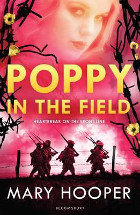Poppy in the field by Mary Hooper

Bloomsbury, 2015. ISBN 9781408827635
(Age: 12+) Highly recommended. World War One. Historical fiction.
Nursing. Historical fiction at its best, Hooper continues the story
of Poppy, a parlour maid from a grand house who joins the VAD's at
the outbreak of World War One. This group of volunteers were able to
rely on money sent from home, but Poppy is supported by a former
teacher, wanting her to break free from her humble origins. In the
first book, Poppy serves at a hospital in Southampton, dealing with
soldiers ferried across the channel from France. She sees the end
result of war, the pain and suffering it causes, the death and
carnage of trench warfare. But rejected by someone she thought loved
her, she volunteers to go to France to serve in the frontline
hospitals. She is sent to a small coastal town where she deals with
soldiers sent on from the hospitals at the fronts. Here she must
deal with soldiers who have received initial help, surgery,
bandaging, assessment, and now are in the second line of aid. She
meets men with limbs amputated, those who feel life is at an end,
those who can't wait to get back home and those who lie to avoid
their girlfriends and families knowing the truth.
She joins a pair of American nurses who try to capture any moment of
fun they can, and several times take out a car to go on a picnic or
simply drive. She meets again Dr Michael from Netley and is drawn to
him. But the strict moral code of Edwardian times still imposed in
time of war sees Poppy almost sent home.
A wonderful story of a young woman learning that she can do things
beyond those set by custom and society as she plays an important
role in the hospitals abroad. Her hospital is an old casino in
Boulogne and here she proves her metal. She meets other women who
have come to be of service, none more so than the two women who set
up a surgery near the front line in Belgium to treat soldiers for
minor complaints to allow the doctors to get on with the war wounds,
and the two American nurses wanting to do their bit.
Based on much research, this story is easy to read and engaging,
giving a well grounded look at how the immediate aftermath of
fighting was dealt with. And the romantic involvements running
through the story add an extra piquancy which readers will enjoy.
Fran Knight